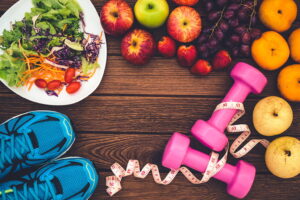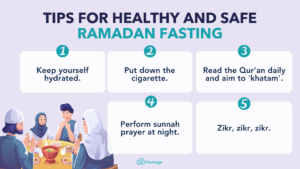Ramadan, the holiest month in Islam, is a time of spiritual reflection, self-discipline, and increased devotion. One of the fundamental aspects of Ramadan is fasting, during which Muslims abstain from food and drink from dawn until sunset. While fasting is primarily observed for religious reasons, it also offers numerous health benefits and serves as a reminder of the importance of nourishing the body in a balanced and mindful manner.
1. Introduction
Fasting during Ramadan is not only a religious obligation but also a beneficial practice for physical and mental health. As Muslims worldwide embark on this spiritual journey, it is essential to recognize the significance of Ramadan fasting for the body and understand how to maintain optimal health during this sacred month.
2. Health Benefits
– Weight Loss
Ramadan fasting provides an opportunity for individuals to achieve their weight loss goals. By limiting food intake to specific hours of the day, fasting promotes calorie restriction and facilitates fat burning, leading to gradual and sustainable weight loss over time.

– Improved Metabolic Health
Fasting during Ramadan can lead to improvements in metabolic health, including lower blood sugar levels, improved insulin sensitivity, and reduced risk factors for metabolic disorders such as diabetes and cardiovascular disease.
– Enhanced Spiritual Well-being
Beyond its physical benefits, Ramadan fasting fosters spiritual growth and emotional well-being. By refraining from worldly distractions and focusing on prayer, reflection, and acts of kindness, fasting helps individuals deepen their connection with their faith and cultivate a sense of inner peace and contentment.
3. Tips for Healthy Eating
– Balanced Suhoor and Iftar Meals
Suhoor, the pre-dawn meal, and Iftar, the meal to break the fast at sunset, are essential components of Ramadan fasting. It is crucial to start the day with a nutritious and balanced Suhoor meal that provides sustained energy throughout the day. Likewise, Iftar should include a variety of nutrient-dense foods to replenish energy stores and nourish the body after a day of fasting.
– Hydration During Fasting Hours
Staying hydrated is essential during Ramadan fasting, especially in warm climates. It is essential to drink plenty of water and hydrating fluids during non-fasting hours to prevent dehydration and maintain optimal health. Avoid sugary and caffeinated beverages, as they can lead to increased thirst and dehydration.
– Mindful Food Choices
During Ramadan, it is essential to make mindful food choices and prioritize nutrient-rich foods that provide essential vitamins, minerals, and antioxidants. Include a variety of fruits, vegetables, whole grains, lean proteins, and healthy fats in your meals to meet your nutritional needs and support overall health.

– Portion Control
Practicing portion control is key to preventing overeating and digestive discomfort during Ramadan. Use smaller plates and utensils to help control portion sizes, and listen to your body’s hunger and fullness cues. Avoid indulging in excessive or unhealthy foods, and focus on eating mindfully and intuitively.
– Incorporating Physical Activity
Maintaining regular physical activity during Ramadan is important for overall health and well-being. Engage in light to moderate exercise, such as walking, stretching, or yoga, during non-fasting hours to promote circulation, improve mood, and support metabolic function.
4. Conclusion
In conclusion, Ramadan fasting is not only a religious practice but also a valuable opportunity to prioritize health and well-being. By following these tips for healthy eating during Ramadan fasting, individuals can nourish their bodies, maintain energy levels, and support overall health throughout the holy month.
Tips for Healthy Eating During Ramadan Fasting
FAQs (Frequently Asked Questions)
1. Why is Ramadan fasting necessary for the body?
Ramadan fasting offers numerous health benefits, including weight loss, improved metabolic health, and enhanced spiritual well-being. By abstaining from food and drink during daylight hours, fasting promotes self-discipline, detoxification, and overall health.
2. How can I stay hydrated during Ramadan fasting?
To stay hydrated during Ramadan fasting, drink plenty of water and hydrating fluids during non-fasting hours, especially at Suhoor and Iftar meals. Avoid caffeinated and sugary beverages, as they can increase thirst and lead to dehydration.
3. Are there any specific foods to eat during Suhoor and Iftar?
During Suhoor and Iftar, focus on consuming balanced meals that include a variety of nutrient-rich foods, such as fruits, vegetables, whole grains, lean proteins, and healthy fats. Incorporate foods that provide sustained energy and essential nutrients to support overall health during Ramadan fasting.
4. How can I prevent overeating during Ramadan?
To prevent overeating during Ramadan, practice portion control, and listen to your body’s hunger and fullness cues. Use smaller plates and utensils to control portion sizes, and avoid indulging in excessive or unhealthy foods. Eat mindfully and intuitively, and stop eating when you feel satisfied.
5. Is it safe to exercise during Ramadan fasting?
Yes, it is safe to engage in light to moderate exercise during Ramadan fasting. Incorporate activities such as walking, stretching, or yoga during non-fasting hours to promote physical fitness, improve mood, and support overall health and well-being.
